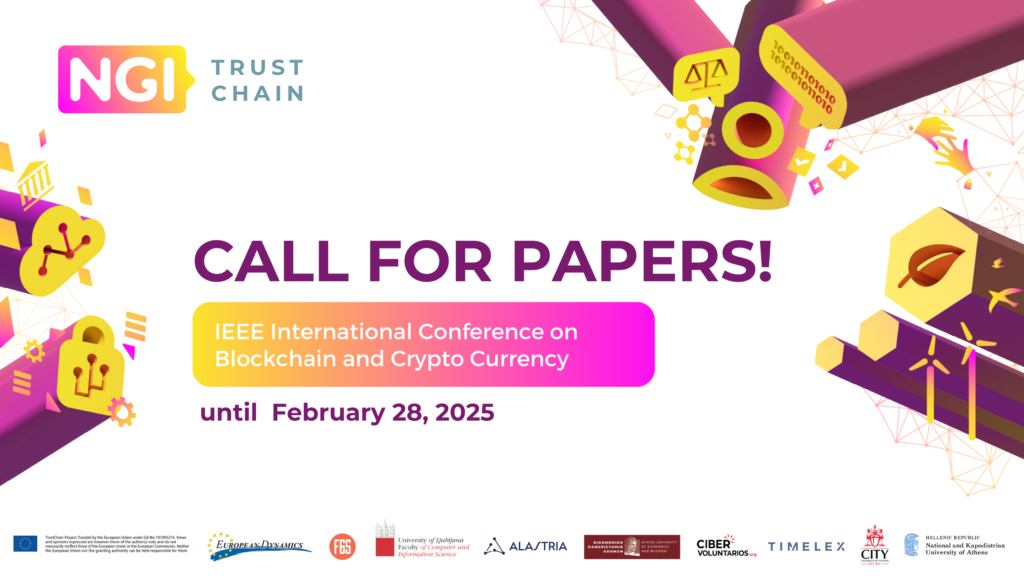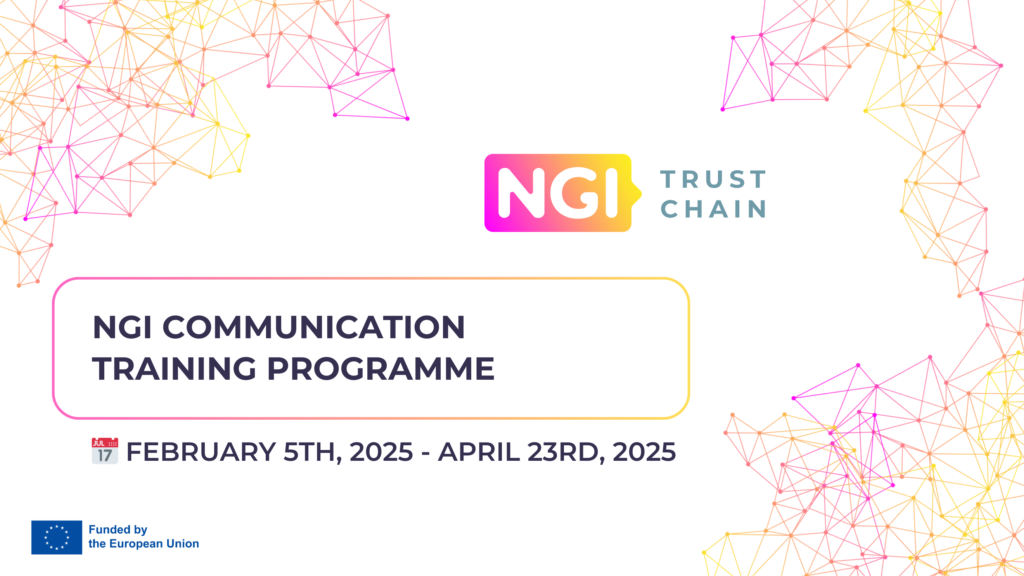Announcing the 2nd Trustchain Workshop at IEEE Blockchain & ICBC 2025

Following the success of the inaugural Trustchain workshop at IEEE Blockchain, we are thrilled to announce the 2nd International Workshop on Fostering a Human-Centered, Trustworthy, and Sustainable Internet (TRUSTCHAIN 2025). This year, the workshop will be collocated with the prestigious IEEE International Conference on Blockchain and Cryptocurrency (ICBC 2025). We invite researchers, industry professionals, policymakers, […]
Join the NGI Communication Training Programme!

The NGI Outreach Office offers you a comprehensive and personalised digital communication training programme. Whether you are a direct actor in the NGI initiative (CSA or RIA) or an innovator funded by NGI, doing without excellent online communication today is unthinkable. Identifying the best European projects to be funded, or promoting your innovations, solutions or products is essentially a matter […]
Interview: Meet the NG-SC team!

The NG-SC team, comprising experts in blockchain, distributed systems, and sensor networks from InnoRenew CoE and the University of Primorska, is advancing decentralized technologies with a focus on privacy and innovation. In the interview, they share their approach to leveraging IoT and decentralized solutions to address privacy concerns and empower users with data ownership, contributing […]
Interview: Meet the PECS team!

The PECS team, made up of academics and researchers from the University of Catania and the University of Modena and Reggio Emilia in Italy, is focused on advancing security and privacy-enhancing technologies. In the interview, they discuss their multidisciplinary approach and the team’s work in addressing privacy concerns within the automotive sector. Can you briefly […]
Interview: Meet the GUEHDS team!

GUEHDS is an innovative consortium uniting key players in health and data technology. At its core are Instituto Pedro Nunes, a R&D center and business incubator in Coimbra, Portugal, and two major healthcare providers—the Local Health Units of Coimbra and Santo António—serving the North and Central regions of the country. Leading the consortium is Promptly […]
Interview: Meet the dGUARD team!

The dGUARD project team brings together the expertise of three dynamic partners: the i2CAT Foundation, Bloock, and TopDoctors. This collaborative consortium leverages each partner’s specialized skills to develop and pilot dGUARD, an innovative, privacy-centric data-sharing platform tailored for healthcare applications. Bloock contributes robust SSI and blockchain components for secure data handling, while i2CAT focuses on […]
Interview: Meet the SURE team!

Clearbox AI is an award-winning tech startup specializing in synthetic data for privacy preservation and data augmentation. The SURE team, led by CEO Shalini Kurapati, CTO Luca Gilli, and Machine Learning Engineer Dario Brunelli, has an impressive track record in both R&D and commercial projects centered around trustworthy AI, with a focus on data-centric AI, […]
Forging the Future of Web3 Funding with the WID3+ Consortium: Insights from Bangkok’s Blockchain Events and Authbond’s Progress

The second week of November was a busy and exciting time for the Web3 community, especially for those in the Ethereum ecosystem. With the 7th Ethereum-focused conference and Thailand Blockchain Week 2024 happening in Bangkok from November 6th to 16th, members of the WID3+ Consortium were on the ground actively contributing to the events and […]
TrustChain Open Call 5 webinar #2

🚀 Calling all developers, innovators, researchers, SMEs, and entrepreneurs! With €1.989M in funding, TrustChain Open Call #5 is still open, supporting up to 17 innovative projects! Open Call #5 Topic: “Green, Scalable, and Sustainable DLTs” 🌍We’re looking for groundbreaking ideas that balance energy efficiency, scalability, and trustworthiness in distributed ledger technologies (DLTs). Projects should prioritize […]
Interview: Meet the EIDCMP team!

In today’s interview, we are excited to speak with the team behind EIDCMP, a consortium that brings together expertise from WalliD, APBC, and Bloq4U. Together, they are working on the WalliD CertiShop platform, which focuses on secure, digital certificate solutions. With each organization bringing its own unique strengths—WalliD’s leadership in digital identity, Bloq4U’s blockchain consulting, […]
